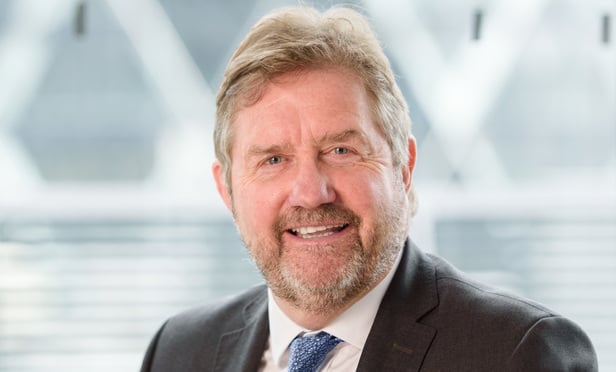Kennedys targets further US expansion as firm eyes post-merger west coast move
Kennedys senior partner Nick Thomas on the CMK merger, integration and going global
May 08, 2017 at 06:27 AM
5 minute read
"There will only be three or four insurance specialist firms in five years' time, and having operations in the States is key to being one of the ones that are left," says Kennedys senior partner Nick Thomas.
Thomas's bold prediction comes after the firm last week announced that it is to merge with 100-lawyer US insurance firm Carroll McNulty & Kull (CMK), a deal that will see it operate as Kennedys CMK in the US, and Kennedys abroad.
The addition of CMK's bases in New York, New Jersey, Pennsylvania, Illinois and Texas takes Kennedys' global network to 32 offices, as the firm attempts to secure its place as a truly global player in the increasingly competitive insurance legal services market.
And Thomas is already earmarking further expansion for the merged firm.
"The only gap there is the west coast – that is something [CMK co-founder] Chris Carroll and I have been looking at – we will have to see if we can't bolt a west coast office on to the Kennedys CMK footprint."
A US merger has been a key part of Kennedys' strategy for at least five years, and some years ago the UK firm approached CMK about a tie-up. However, according to Thomas, CMK "decided they needed to do their own growing first".
When the merger goes live on 1 June, CMK will join Kennedys as a fully integrated part of the firm, with 43 US partners joining Kennedys' single profit pool.
Thomas says: "I don't see how you can do this sort of thing without that. If you have a different balance sheet and profit and loss, you will inevitably get people clinging to business. This only works if everyone is in it for the firm and the common gain."
Thomas argues that a merger was the most effective way of entering the US market, saying: "Some seem to treat America as a dartboard; to throw a dart and open an office wherever it lands – but it is far better to go in with people who we know and trust."
He says the firm "did Latin America last year" - opening offices in Brazil, Peru, Chile, Colombia and Mexico – and has been growing its European and Asian footprints, leaving North America as "an obvious big hole".
Kennedys posted global revenues of £138.8m for 2015-16, placing it 30th in the UK top 50, with profit per equity partner of £458,000. At the end of the financial year the firm had 177 partners, of who 64 were full equity. CMK's most recent revenue figures put the firm at $40.8m (£31.5m).
Thomas says that while the firms do share common clients, they are "slightly different across the board".
"We have a lot of major clients, who, while they are American or have a presence in America, are not using CMK," says Thomas. "Likewise, they have clients with issues around the world who know Kennedys, but are not necessarily using us, so there is a great synergy there for growth." Thomas identifies risk management company Fairfax Group and underwriter CNA Hardy as existing shared clients of the two firms.
The merger is part of what one senior partner at a rival insurance firm calls the "arms race that is international law firms", adding that the tie-up looks to be "about building an international footprint so you can operate as an integrated one-stop shop".
Most of the UK's other major insurance law firms have been targeting the US for expansion in recent years.
Clyde & Co, having opened in the US just over a decade ago, now has nearly 50 partners and 200 lawyers across eight US offices including Atlanta, San Francisco, Newport Beach, New Jersey and New York City.
Meanwhile, DAC Beachcroft and Weightmans both recently announced the launch of international alliances with US components.
Earlier this year, DAC Beachcroft launched Legalign Global in conjunction with US firm Wilson Elser Moskowitz Edelman & Dicker, German insurance leader Bach Langheid Dallmayr and Australian insurance specialist Wotton + Kearney.
Weightmans followed suit last month with the launch of the Insurance Law Global network, which comprises US firm Marshall Dennehey Warner Coleman & Goggin, Spain's Rodrigo Abogados and Canada's Blaney McMurty.
Thomas argues that his own firm's international growth has been overlooked by the market and the media in recent years.
"The perception of us always seems to be about five years out of date – we are not a London firm with a few overseas offices; we are a global firm," he says.
"The way forwards for the large niche firms like us who specialise in insurance is to be like our clients and internationalise, and be able to provide our services to them wherever in the world they want it."
This content has been archived. It is available through our partners, LexisNexis® and Bloomberg Law.
To view this content, please continue to their sites.
Not a Lexis Subscriber?
Subscribe Now
Not a Bloomberg Law Subscriber?
Subscribe Now
NOT FOR REPRINT
© 2025 ALM Global, LLC, All Rights Reserved. Request academic re-use from www.copyright.com. All other uses, submit a request to [email protected]. For more information visit Asset & Logo Licensing.
You Might Like
View All
Insurance Practice DWF Takes Team of 53 Lawyers From Australian Firm
2 minute read
Kirkland, Debevoise & Nishimura Advise On $8.2B Japanese Acquisition of Resolution Life

Covington Swipes Mishcon Insurance Disputes Head for New Practice Launch in London
3 minute read
Asia Pacific Hires: Global Firms Kick Off Q4 with Flurry of Team Hires Across the Region
10 minute readTrending Stories
Who Got The Work
J. Brugh Lower of Gibbons has entered an appearance for industrial equipment supplier Devco Corporation in a pending trademark infringement lawsuit. The suit, accusing the defendant of selling knock-off Graco products, was filed Dec. 18 in New Jersey District Court by Rivkin Radler on behalf of Graco Inc. and Graco Minnesota. The case, assigned to U.S. District Judge Zahid N. Quraishi, is 3:24-cv-11294, Graco Inc. et al v. Devco Corporation.
Who Got The Work
Rebecca Maller-Stein and Kent A. Yalowitz of Arnold & Porter Kaye Scholer have entered their appearances for Hanaco Venture Capital and its executives, Lior Prosor and David Frankel, in a pending securities lawsuit. The action, filed on Dec. 24 in New York Southern District Court by Zell, Aron & Co. on behalf of Goldeneye Advisors, accuses the defendants of negligently and fraudulently managing the plaintiff's $1 million investment. The case, assigned to U.S. District Judge Vernon S. Broderick, is 1:24-cv-09918, Goldeneye Advisors, LLC v. Hanaco Venture Capital, Ltd. et al.
Who Got The Work
Attorneys from A&O Shearman has stepped in as defense counsel for Toronto-Dominion Bank and other defendants in a pending securities class action. The suit, filed Dec. 11 in New York Southern District Court by Bleichmar Fonti & Auld, accuses the defendants of concealing the bank's 'pervasive' deficiencies in regards to its compliance with the Bank Secrecy Act and the quality of its anti-money laundering controls. The case, assigned to U.S. District Judge Arun Subramanian, is 1:24-cv-09445, Gonzalez v. The Toronto-Dominion Bank et al.
Who Got The Work
Crown Castle International, a Pennsylvania company providing shared communications infrastructure, has turned to Luke D. Wolf of Gordon Rees Scully Mansukhani to fend off a pending breach-of-contract lawsuit. The court action, filed Nov. 25 in Michigan Eastern District Court by Hooper Hathaway PC on behalf of The Town Residences LLC, accuses Crown Castle of failing to transfer approximately $30,000 in utility payments from T-Mobile in breach of a roof-top lease and assignment agreement. The case, assigned to U.S. District Judge Susan K. Declercq, is 2:24-cv-13131, The Town Residences LLC v. T-Mobile US, Inc. et al.
Who Got The Work
Wilfred P. Coronato and Daniel M. Schwartz of McCarter & English have stepped in as defense counsel to Electrolux Home Products Inc. in a pending product liability lawsuit. The court action, filed Nov. 26 in New York Eastern District Court by Poulos Lopiccolo PC and Nagel Rice LLP on behalf of David Stern, alleges that the defendant's refrigerators’ drawers and shelving repeatedly break and fall apart within months after purchase. The case, assigned to U.S. District Judge Joan M. Azrack, is 2:24-cv-08204, Stern v. Electrolux Home Products, Inc.
Featured Firms
Law Offices of Gary Martin Hays & Associates, P.C.
(470) 294-1674
Law Offices of Mark E. Salomone
(857) 444-6468
Smith & Hassler
(713) 739-1250









